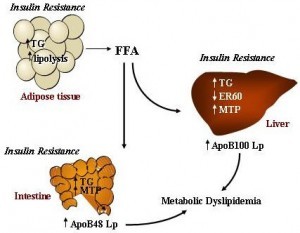 Insulin Resistant: In order to understand what insulin resistant is, we must first understand what insulin is. Insulin is secreted by the pancreas. There are a cluster of cells called the Islets of Langerhans. Some of these cells are the cells that produce insulin. Once your pancreas notices a rise in the blood glucose level it starts to release the insulin into your blood stream so the insulin can take the blood glucose an put it into cells to be used as energy.
Insulin Resistant: In order to understand what insulin resistant is, we must first understand what insulin is. Insulin is secreted by the pancreas. There are a cluster of cells called the Islets of Langerhans. Some of these cells are the cells that produce insulin. Once your pancreas notices a rise in the blood glucose level it starts to release the insulin into your blood stream so the insulin can take the blood glucose an put it into cells to be used as energy.
In some people however, the insulin can not deliver the glucose into the cells. For whatever reason, their cells simply refuse delivery so to speak. So in order for your pancreas to keep the blood glucose level under control, it has to secret additional insulin. However, their body’s cells will not respond or refuse to accept the higher level of insulin. This is known as insulin resistance. Usually once their body’s cells start to resist the insulin, the glucose is going to build up in their blood and could result in type 2 diabetes. Type 2 diabetes occurs when their cells refuse the insulin no matter how high the level and their body doesn’t respond at all to it. There is also the risk of developing Syndrome X with insulin resistance. Syndrome X is a cluster of risk factors for heart disease such as low HDL cholesterol (the good kind), hyperglycemia and hypertension. There are some people however who have insulin resistance but are still able to produce enough insulin to keep their blood glucose levels near normal. However though just about everyone who does have type 2 diabetes is insulin resistant.
No one really knows for sure what causes insulin resistance. One of the most common believed causes of insulin resistance is obesity and not exercising. However no one has been able to prove that this is what causes insulin resistance. Obesity and no physical activity has been show to aggravate insulin resistance, some feel that a diet high in carbohydrates may cause insulin resistance, as well as a diet high in sugar. Many scientists believe that it is caused by a defect in a certain gene. Some possible symptoms that could indicate there might be a problem are of fatigue, brain fogginess, low blood sugar level, intestinal bloating, high blood pressure, and depression. However the only way that insulin resistance can be diagnosed is through a glucose tolerance test. If you have to have a glucose tolerance test, be prepared to take a dose of glucose usually in the form of a drink. Then you will have blood drawn once at 1 hour after you finish and then again about 2 hours after you finish.
You can help prevent insulin resistance by watching your diet and eating healthy. Having a good exercise program is a additional benefit and will not only help you prevent insulin resistant and diabetes, but also a vast majority of other problems to. Make sure your diet is a healthy and well balanced diet that does not consist of just carbohydrates and sugars.